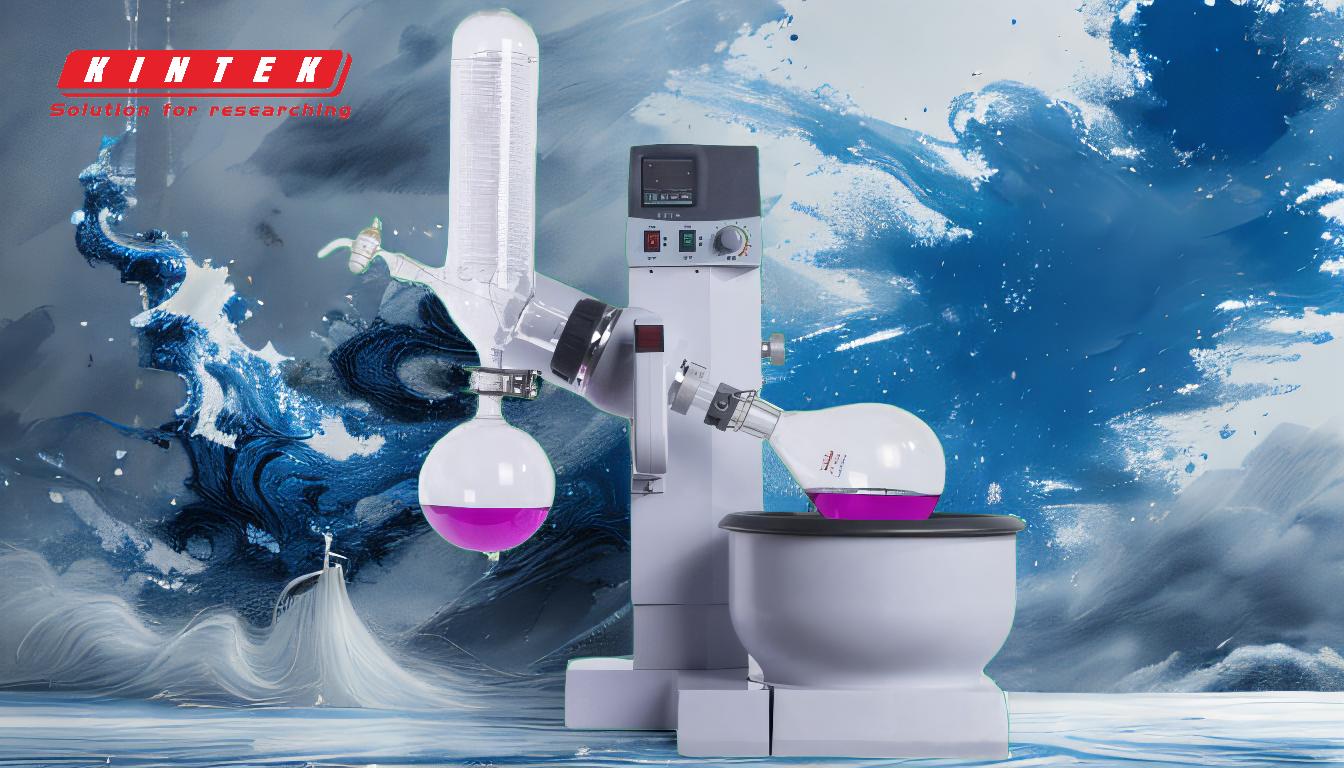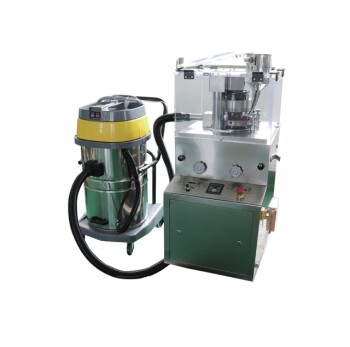A rotary evaporator (rotovap) is a laboratory device used to efficiently and gently remove solvents from samples through evaporation under reduced pressure. It operates by rotating a flask containing the sample, creating a thin film that increases the surface area for evaporation. The system uses a vacuum to lower the boiling point of the solvent, a heated water or oil bath to provide controlled heating, and a condenser to cool and collect the evaporated solvent. This process ensures efficient solvent removal while minimizing thermal degradation of sensitive compounds.
Key Points Explained:

-
Basic Components of a Rotary Evaporator:
- Rotating Flask: The flask holds the sample and rotates to create a thin film, increasing evaporation efficiency.
- Vacuum Pump: Reduces pressure inside the system, lowering the boiling point of the solvent.
- Heated Bath: Provides controlled heating to the rotating flask, typically using water or oil.
- Condenser: Cools the evaporated solvent, converting it back into liquid form for collection.
- Receiving Flask: Collects the condensed solvent after it passes through the condenser.
-
How It Works:
- Rotation and Thin Film Formation: The rotating flask ensures the sample forms a thin, uniform film on the inner walls, maximizing the surface area for evaporation.
- Vacuum Application: The vacuum pump lowers the pressure inside the system, reducing the boiling point of the solvent. This allows solvents to evaporate at lower temperatures, preventing thermal degradation of heat-sensitive compounds.
- Heating: The heated bath provides consistent and controlled heat to the rotating flask, facilitating evaporation.
- Condensation and Collection: The evaporated solvent travels to the condenser, where it is cooled and converted back into liquid form, which is then collected in the receiving flask.
-
Step-by-Step Operation:
- Setup: Place the sample in the rotating flask and secure it to the rotovap. Attach the receiving flask and condenser.
- Rotation: Start the rotation at a moderate speed to create a thin film of the sample.
- Vacuum: Gradually increase the vacuum level until condensation or bubbling is observed.
- Heating: Turn on the heated bath and adjust the temperature as needed.
- Collection: Monitor the process until all the solvent has evaporated and been collected in the receiving flask.
- Shutdown: Release the vacuum, stop the rotation, and remove the flasks.
-
Advantages of Using a Rotary Evaporator:
- Gentle Evaporation: The combination of reduced pressure and controlled heating minimizes the risk of degrading sensitive compounds.
- Efficiency: The thin film formation and large surface area accelerate evaporation.
- Versatility: Suitable for a wide range of solvents, including high-boiling-point solvents like water, dimethylformamide, and dimethyl sulfoxide.
- Preservation of Sample Integrity: The process avoids oxidation and preserves the original properties of the solution.
-
Applications:
- Solvent Removal: Commonly used in chemistry labs to remove solvents from reaction mixtures.
- Concentration: Concentrates samples by evaporating excess solvent.
- Distillation: Separates solvents from mixtures based on differences in boiling points.
- Purification: Used in the purification of compounds by removing impurities through evaporation.
-
Key Considerations for Operation:
- Rotation Speed: Adjust the rotation speed based on the volume and viscosity of the sample to ensure optimal thin film formation.
- Vacuum Level: Gradually increase the vacuum to avoid sudden boiling or bumping of the sample.
- Temperature Control: Use the heated bath to maintain a consistent temperature, ensuring efficient evaporation without overheating.
- Safety: Always reintroduce atmospheric pressure before removing the flask to prevent accidents.
By understanding these key points, users can effectively operate a rotary evaporator to achieve efficient and gentle solvent removal, making it an indispensable tool in laboratory settings.
Summary Table:
| Aspect | Details |
|---|---|
| Key Components | Rotating flask, vacuum pump, heated bath, condenser, receiving flask |
| How It Works | Thin film formation, vacuum application, heating, condensation, collection |
| Advantages | Gentle evaporation, high efficiency, versatility, sample integrity |
| Applications | Solvent removal, concentration, distillation, purification |
| Operation Tips | Adjust rotation speed, control vacuum level, maintain temperature, safety |
Discover how a rotary evaporator can improve your lab processes—contact us today for expert advice!













